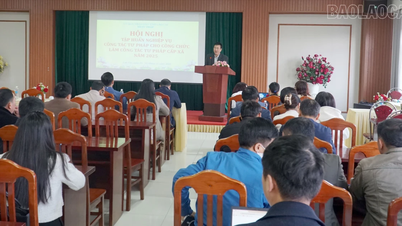The 22-year-old man recently had frequent pain in his lower back and his health was declining. When he went to the doctor, he was diagnosed with kidney failure, the cause of which was said to be staying up late and unscientific eating.

Meanwhile, the 19-year-old female patient was only able to move her limbs slightly after a period of intensive treatment. Before that, this female student suffered a stroke in class and was taken to Bach Mai Hospital by her friends. Notably, before the stroke, she was completely healthy. However, recently, she often stayed up late, sometimes going to bed at 2-3 am to complete group assignments.
A parent brought her daughter to the Institute of Mental Health, Bach Mai Hospital for a check-up. She shared that her daughter was a second-year student at a university, but after school she often closed her room door and did not eat dinner with her family. She only ate at around 9-10 pm, and while eating, she opened her laptop to "group chat" to do homework. Despite repeated reminders, the family was completely powerless to change her living habits.
According to doctors, pressure from work, study, addiction to games, phones, and internet surfing habits are some of the reasons why many people skip sleep. Many patients share that they often stay up late, sleep until 11-12 in the morning and work until 4-5 in the evening. At first, they only think about staying up for a few days to "meet deadlines", but the habit gradually becomes ingrained and when they want to return to normal life, it is very difficult.
Associate Professor, Dr. Nguyen Trong Hung, Associate Professor, Dr. Nguyen Trong Hung, Director of the Center for Nutritional Counseling, Rehabilitation and Obesity Control (National Institute of Nutrition) said that "sleeping during the day and working at night" is a phenomenon that completely reverses the biological rhythm.

This phenomenon is common among teenagers and young adults, especially students, freelancers, online workers, or those who often "play games" or those who often work late at night to meet deadlines.
"Staying up late and eating late at night is a habit that is harmful to health. It disrupts biological rhythms, increases the risk of obesity, reduces digestive and cardiovascular functions, and affects the mind. The stomach has to work continuously, causing bloating, indigestion, metabolic disorders, ulcers, or irritable bowel syndrome. Snacking at night and slow digestion make energy easily converted into excess fat, causing weight gain and belly fat accumulation" - Associate Professor Hung said.
Experts also warn that staying up late causes poor sleep quality, increases stress, reduces memory, reduces concentration and increases the risk of depression; at the same time, it reduces the kidney's ability to detoxify, the eyes have to constantly adjust, leading to reduced vision and increased risk of eye diseases.
A study also showed that people who go to bed from 2 a.m. onwards have a three times higher risk of depression and anxiety disorders than those who go to bed on time, even though their total sleep time is the same.

In Vietnam, an online survey by the Institute of Mental Health (Bach Mai Hospital) showed that 64% of teenagers and young adults regularly sleep after 1am; 32% sleep after 3am at least 3 days/week. More than 70% admitted to losing energy, feeling tired and having difficulty concentrating after a series of days of "staying up late, sleeping during the day".
Many people still consider staying up late to be normal, even proud of "working effectively at night", but according to experts, this is a misconception. Staying up late, sleeping late and lack of sleep not only increase the risk of physical illness but also seriously affect mental health.
Sleep disorders are on the rise, directly impacting daily life, study and work, potentially destroying the careers and lives of young people.
To avoid the habit of "working late at night", everyone should form a habit of getting enough sleep, on time, and limit the use of phones and stimulants before going to bed. People whose jobs require them to stay up late or cannot sleep at night still need to maintain a stable sleep schedule and aim for about 8 hours of deep sleep each day to protect their physical and mental health.
Source: https://baolaocai.vn/nhieu-nguoi-tre-sap-nguon-vi-thuc-khuya-post887406.html







![[Photo] Next to the "mountain of trash" after the flood, Tuy Hoa residents strive to rebuild their lives](/_next/image?url=https%3A%2F%2Fvphoto.vietnam.vn%2Fthumb%2F1200x675%2Fvietnam%2Fresource%2FIMAGE%2F2025%2F11%2F24%2F1763951389752_image-1-jpg.webp&w=3840&q=75)






































































![[Photo] General Secretary To Lam attends the National Conference to review the Party's inspection, supervision and discipline enforcement work in 2025 and the 13th Congress term](https://vphoto.vietnam.vn/thumb/402x226/vietnam/resource/IMAGE/2025/11/24/1763967570884_anh-man-hinh-2025-11-24-luc-13-59-19.png)































Comment (0)